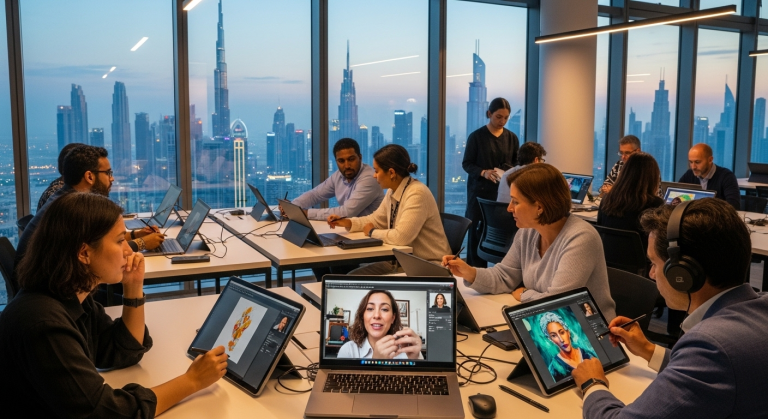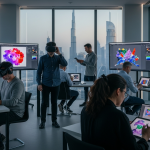Market Analysis and Opportunities
The United Arab Emirates, and Dubai in particular, present a dynamic environment for entrepreneurs looking to launch an online platform for virtual art classes. As the city cements its status as a regional arts and culture hub, demand for accessible, high-quality art education is on the rise. This trend is driven by several factors: a multicultural population, government investment in creative industries, world-class digital infrastructure, and evolving consumer preferences favoring online and blended learning formats.
Recent data from the UAE’s Ministry of Culture and Youth highlights a 10% annual growth in the country’s creative economy, while e-learning sector estimates forecast a CAGR of over 13% between 2022 and 2027 (Source: Statista, UAE Digital Learning Market). Dubai’s position as a cosmopolitan business center, coupled with its support for digital innovation, creates significant opportunities for businesses that offer tailored educational experiences to residents, expatriates, and international audiences alike.
Comprehensive Business Overview
An online platform for virtual art classes operates within the growing digital education and creative industries sectors. Its primary business model revolves around offering live or recorded art lessons, personalized coaching, and interactive workshops accessible via the internet. Revenue streams can include subscription models, pay-per-class fees, certification courses, B2B partnerships with schools or corporates, and commissioned virtual events.
Target Audience:
- Young learners and K-12 students seeking extracurricular enrichment
- Adult hobbyists and expatriates with a passion for art
- Professional artists and designers looking for advanced courses
- Businesses, schools, and cultural organizations seeking bespoke art workshops
Operational Scope in the UAE:
- Live-streamed and on-demand classes accessible across UAE emirates
- Multi-language support to address Dubai’s multicultural society
- Integration with local art events and exhibitions for hybrid learning
Mission, Vision, Core Objectives:
- Mission: Democratize art education, making it affordable, flexible, and globally accessible
- Vision: Emerge as the leading regional provider for digital art learning, fostering creativity and cultural exchange
- Objectives: Build a sustainable user base, leverage local and international instructors, partner with cultural entities, and drive positive social impact through the arts
Business Stage and Location:
The concept is typically positioned in the startup or early growth phase. In Dubai, optimal setup includes establishing the business within a Free Zone like Dubai Internet City, or Dubai Design District (d3), to benefit from full foreign ownership, reduced taxes, and streamlined licensing processes.
Competitive Advantage
Unique Value Proposition (UVP):
A robust online art platform distinguishes itself with proprietary teaching tools, exclusive content, and multi-tiered course offerings. Considerations such as AR/VR technology, AI-aided interactive platforms, and partnerships with regional galleries add additional value.
- For Entrepreneurs: The model leverages Dubai’s global connectivity, robust internet penetration (99% as of 2023), and booming creative industry, making it scalable and low-risk compared to traditional brick-and-mortar academies.
- For Investors: High margins, rapid customer acquisition, and the capacity for B2B/B2C diversification provide multiple exit strategies and attractive ROI prospects. The business is also aligned with Dubai’s Smart City and Vision 2030 blueprints.
- For Managers: Operational advantages include low fixed costs, access to a highly educated local workforce, and simplification of scaling through digital delivery. Strategic use of learning analytics enables ongoing course optimization.
Key Strengths:
- Use of proprietary or licensed content and a scalable tech platform
- Strategic partnerships with established artists and institutions
- Customizable course offerings and tiered pricing
- Agile adaptation to shifting consumer and education trends
Target Market Analysis
Market Size and Trends:
- The UAE’s creative sector is valued at over AED 37 billion, with art education comprising a substantial share.
- E-learning and EdTech markets in MENA are forecasted to reach $700 million by 2025.
- Dubai has prioritized digital and creative industries under its “Dubai Creative Economy Strategy.”
Consumer Behavior:
- Tech-savvy residents prefer personalized, interactive experiences available 24/7.
- Interest in art as a wellness and self-expression tool is rising, driving enrollments among both youth and adults.
- Luxury and premium offerings, such as masterclasses with renowned artists, see high demand in affluent Dubai communities.
Industry Trends:
- Digital transformation is disrupting traditional education, leading to increased demand for flexible, remote learning.
- Adoption of sustainability principles (paperless, eco-friendly materials) appeals to the UAE’s responsible consumer base.
- Gamification, microlearning, and AI-driven personalization enhance learner engagement and retention rates.
Marketing Needs and Recommendations
To succeed in the competitive UAE EdTech landscape, businesses must invest in sophisticated marketing strategies tailored to Dubai’s demographics:
- In-depth market research to segment users by language, age, profession, and artistic interest
- SEO campaigns focused on keywords like “art classes in Dubai,” “online art tutorials UAE,” and “creative courses Dubai”
- Invest in targeted PPC ads and social media influencer partnerships, leveraging platforms such as Instagram, Snapchat, and TikTok
- Strong visual branding and UX design to stand out in digital marketplaces
- Activate cross-promotional partnerships with local art fairs, galleries, and schools
- Develop engaging blog content for ongoing organic reach; see Persian Horizon’s blog as an example
Expansion Potential
- Extend offerings to B2B clients such as schools, corporates (for team building), and event organizers
- Regional scaling into other GCC countries, using Dubai as a launchpad
- Introduce specialized tracks (digital art, fashion illustration, calligraphy) for niche audiences
- Export UAE art education content to global markets via licensing or franchising
Financial and Investment Needs
Financial Requirements:
- Business setup and licensing in a Dubai Free Zone: AED 25,000 – AED 50,000
- Platform development (custom LMS, mobile apps): AED 150,000 – AED 250,000
- Content creation, partnerships, and artist onboarding: AED 75,000 – AED 150,000
- Digital marketing and brand awareness: AED 100,000 – AED 200,000 annual budget
- Initial staffing and operational reserves: AED 100,000 – AED 200,000
Investment Potential:
- Low overheads and scalable cloud-based operations make for favorable margins
- Potential for seed or venture capital investment, especially for platforms with proprietary technology or a unique business model
- EBITDA margins for successful EdTech platforms can reach 20%–35% within two years of launch
- Dubai’s current regulatory and incentives landscape is attractive for foreign investors; see Investment Consulting Services for optimal strategies
Recommended Investment Models:
- Convertible notes or SAFE agreements for early-stage capital raising
- Equity partnerships to tap into investor networks and local expertise
- Revenue-sharing arrangements for content creators to align interests and reduce fixed salary costs
Financial Risks and Mitigation:
- Cash flow volatility – mitigated through tiered subscription offerings and corporate contracts
- Currency fluctuations – minimize risk by billing in AED or USD
- High customer acquisition costs – rely on referral marketing, organic SEO, and bundled offers with educational institutions
- Legal and regulatory risks – partner with experienced local consultants, such as Business Setup Services
Human Resources and Recruitment
Workforce Needs:
- Tech developers (software and UX designers): 2–5 permanent staff
- Marketing and content specialists: 3–4 staff plus freelancers
- Art instructors (freelance/contractual basis with possibility for full-time employment)
- Customer support and platform moderation: 2–3 employees
Critical Skills:
- Expertise in online pedagogy, digital marketing, and EdTech integration
- Bilingual or multilingual capabilities (Arabic, English, additional languages preferred)
- Understanding of UAE’s cultural and regulatory context
HR Challenges and Solutions:
- Fierce competition for tech and creative talent – offer flexible work arrangements, ongoing learning, and attractive incentive packages
- Attract and retain international experts through residency support; consider Residency and Citizenship Services
- Develop in-house training and upskilling programs to retain top performers
Compliance with UAE Labor Laws
- Ensure proper labor contracts, visa processing, and clear end-of-service benefits per UAE legal mandates
- Adopt digital HR management systems to track compliance and employee records
- Engage with authorized PRO services or legal advisors to remain updated on policy changes
Infrastructure and Operations
Infrastructure Needs:
- Cloud-based Learning Management System (LMS) and streaming platforms (e.g., AWS, Azure, or local alternatives)
- Minimal physical footprint—optional use of co-working offices in Free Zones (e.g., d3, In5 Innovation Center)
- Professional-grade audio/video equipment for content creation
Cost-Effective Solutions:
- Lease co-working space or virtual offices for administrative purposes
- Utilize SaaS applications for communication, HR, and CRM management
Operational Optimization:
- Deploy ERP systems and automated billing to streamline workflows
- Adopt agile methodologies for rapid course development and feedback integration
- Outsource non-core functions (e.g., IT maintenance, legal) to reduce overheads
Legal Compliance:
- Company registration with Dubai Department of Economic Development (DED) or relevant Free Zone Authority
- Procure trade licenses (education, digital services)
- Open a corporate bank account compliant with UAE KYC/AML standards
Innovation and Technology
- Integrate AR/VR tools for immersive art instruction
- Deploy AI for personalized learning paths, progress analytics, and content recommendations
- Adopt blockchain or NFT technology for digital certification or virtual art marketplaces
- Continuously review emerging EdTech tools to maintain competitive edge
Marketing and Branding Strategies
Brand Status:
- Branding should project creativity, inclusivity, and professional excellence
- Develop a distinctive logo, cohesive visual identity, and a platform UI tailored to diverse users
Areas for Improvement:
- Leverage community engagement through user-generated content and testimonials
- Invest in SEO-optimized website and mobile app development for brand credibility; learn from Persian Horizon’s services
Marketing Channels:
- Emphasize high-impact digital marketing (SEO, scheduled PPC campaigns, regular social media content, influencer outreach)
- Employ email marketing and retargeting for customer retention
- Participate in local and regional art events for offline visibility
- Explore traditional media PR to access non-digital audiences
360-Degree Campaigns
- Combine social media contests, virtual art exhibitions, and email newsletters to build community
- Partner with influencers and educational organizations for cross-promotion
- Host quarterly webinars or live-streamed workshops featuring celebrated artists
- Utilize CRM tools for customer segmentation and targeted communication
Growth and Development Potential
Growth Strategies:
- Expand to corporate training and “art therapy” workshops for businesses
- Develop Arabic-language and youth-focused content to tap new market segments
- Form alliances with local government initiatives or cultural councils
- Leverage affiliate marketing and referral programs for organic growth
Networking:
- Engage with local art associations, event organizers, and EdTech accelerators
- Explore opportunities through platforms with broad international reach – companies like Persian Horizon can facilitate introductions and partnerships
International Potential:
- Global demand for quality art education and cultural exchange is rising
- Dubai’s geographic location and air connectivity position it as an excellent gateway to export virtual courses across GCC, MENA, Asia, and Europe
- Potential to attract students from abroad through hybrid models (online classes paired with Dubai-based art retreats)
Sustainability and Innovation
- Embrace eco-friendly digital practices (energy-efficient servers, paperless admin)
- Offer courses on sustainable art practices (upcycling, eco-materials)
- Engage in CSR initiatives supporting the local creative community, aligned with “Dubai Vision 2030” and the Emirates’ focus on knowledge-based, sustainable development
Alignment with Dubai’s Market
Cultural Alignment:
- Curriculum tailored for both Arab and expatriate audiences
- Content delivery in multiple languages (Arabic, English, Hindi, Tagalog) accommodates Dubai’s diverse demographic
- Topic selection reflects both classical and contemporary art themes relevant to local sensibilities
Regulatory Compliance:
- Adhere to UAE commercial and tax laws (including VAT registration if turnover exceeds AED 375,000/year)
- Ensure educational content meets local moral and cultural standards; consult with legal advisors where necessary
- Annual reviews of labor, IP, and data privacy (GDPR) policies
Strategic Advantages of Dubai:
- No personal income tax and negligible corporate tax on qualifying Free Zone activities
- World-class digital infrastructure and supportive business ecosystems
- Easy access to global markets via air, sea, and fiber connectivity
- Stable regulatory environment with pro-investment government policies
Addressing Local Challenges:
- High competition: Stand out via specialization, unique partnerships, and unmatched service quality
- Operational costs: Leverage virtual operations, automations, and outsourced talent to control expenses
- Regulatory complexity: Work closely with local consultants or partner with business setup experts to maintain compliance
Conclusion
The UAE, with Dubai at its center, offers a robust platform for launching an online art education business. By leveraging the region’s digital infrastructure, favorable business environment, and thriving cultural landscape, entrepreneurs and investors can tap into a lucrative and socially impactful market. Clear strategic planning—across marketing, operations, HR, and compliance—will be key to standing out and sustaining growth.
For those seeking expert guidance on company formation, operational strategy, or investment in UAE’s education sector, explore how Persian Horizon’s services can accelerate your business launch and long-term success.
Call to Action
Ready to enter Dubai’s booming digital education market? Connect with specialists at Persian Horizon for tailored support with business setup, investment consulting, compliance, and market entry. Visit our services page to learn more, or read the latest industry trends on our blog. Shape the future of art education in the UAE—start today!







